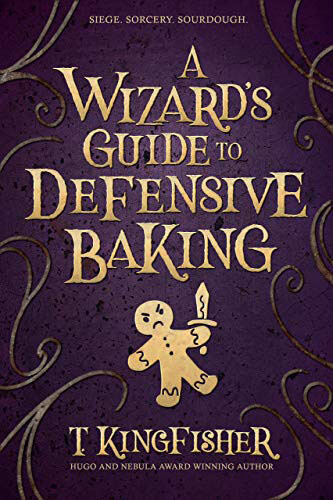2021 is almost here, time for one more book from 2020! This week we’ll take a look at T. Kingfisher’s A Wizard’s Guide to Defensive Baking.
The city of Riverbraid has always been fairly nice for wizards. Not everyone is okay with magic, so in other towns Mona might have had to deal with registration, or forced labor, or imprisonment. As it is, she’s been free to use her – admittedly minor – magical talents to help out her aunt and uncle. Running a full time business isn’t easy, especially when you’re only fourteen, but Mona’s good enough at it to make a comfortable life for herself.
Then one morning she finds a dead body downstairs. Before the end of the day she’s been hauled before a tribunal for murder and becomes the target of a campaign against magic-users. Before the end of the month she finds herself the Head Wizard of Riverbraid, responsible for defending the town against an invading army.
Mona’s magical skills by the way revolve entirely around baking. That’s it. Muffins, anyone?
What was I going to do, bake an attack scone at him?
One of the biggest charms of Kingfisher’s writing is the combination of the fantastical with the everyday, often in ways you completely don’t expect. Having a magical talent that only works with baked goods has got to be one of the best ways to highlight this skill, because you don’t get much more everyday than the act of mixing flour and waiting for bread to rise.
Most of Mona’s magical skills are useful, but not all that showy. It’s handy to be able to convince bread dough to not burn, or to gently suggest that overworked biscuit dough could maybe bake up fluffy anyway, please? If she’s feeling particularly vicious she can silently tell the bread in someone’s sandwich to go stale between bites. Her biggest talent is more of a party trick: she can get gingerbread men to dance for customers, although the types of dances vary from batch to batch.
Don’t ask me where the cookies get the dances they do – this batch had been doing hornpipes. The last batch did waltzes, and the one before that had performed a decidedly lewd little number that had even made Aunt Tabitha blush. A little too much spice in those, I think. We had to add a lot of vanilla to settle them down.
(Oh, and Mona has a mildly carnivorous sourdough starter in the basement. It’s pretty much unkillable at this point. Mona’s the only one that can get close to feed it, and it eats the occasional rat, but the bread they make from it always turns out fantastic, so they just named it Bob and pretend all of this is normal. I can see the dedicated bakers nodding at this; sourdough starter is notoriously finicky, so if you have one that won’t suddenly die or become infested with flies and it makes great bread, then what’s a few rats?)
The tone of the book is the irresistible mix of wry humor and action that I’ve come to expect from Kingfisher, and it also starts on a very dark note with a murdered body being found in the bakery in the book’s first line. There’s a dark thread running through the entire story, with fourteen-year-old Mona having to grow up fast when she has to deal with a mysterious assassin taking out wizards (and several horrifying scenes of omigod he’s right behind you), and the more insidious menace from a government that’s figured out the best way to keep citizens from asking too many questions.

And let’s not forget an invading army that’s closing in on the town, and Mona being the closest thing to a battle-wizard who can do anything about it, with only a knowledge of pastries and some small experience with baking for formal weddings to fall back on.
…if things go wrong in a siege you’ll all die horribly, and in formal weddings the stakes are much higher.
Mona may not be happy with having to use her skills in a war setting – in fact doing anything violent with food feels like the exact opposite of everything a baker stands for – but I loved the ways that Kingfisher found to weaponize baked goods. There are quite a few stand-up-and-cheer moments, plus a few that were laugh out loud hilarious, like Mona and her homeless friend Spindle having to break into the palace through the Duchess’s bathroom, or a batch of evil gingerbread men getting into a fistfight and hurling walnuts at each other in the kitchen.
Kingfisher apparently started writing this book in 2007, but there’s quite a bit that feels very relevant to (gestures vaguely) everything that’s going on now. There’s the political distraction strategy of singling out a person or a group of people and claiming that they’re the real enemy. (Especially effective if you can call people “patriots” at the same time.) But something that Mona keeps coming back to again and again is the whole idea of “heroes”. Not the fact that they exist, but the fact that two children have to step in and save the day because there were things that someone in charge should have been doing to keep everyone safe. And no one did.
You expect heroes to survive terrible things. If you give them a medal, then you don’t ever have to ask why the terrible thing happened in the first place. Or try to fix it.
Sounds familiar, doesn’t it? The fact that people are sometimes forced into being a hero doesn’t take one bit away from how amazing they are when they succeed. And medals and accolades and everyone cheering them on is great. But you know what would be even better? Not allowing things to get so bad that they needed to be heroes in the first place.